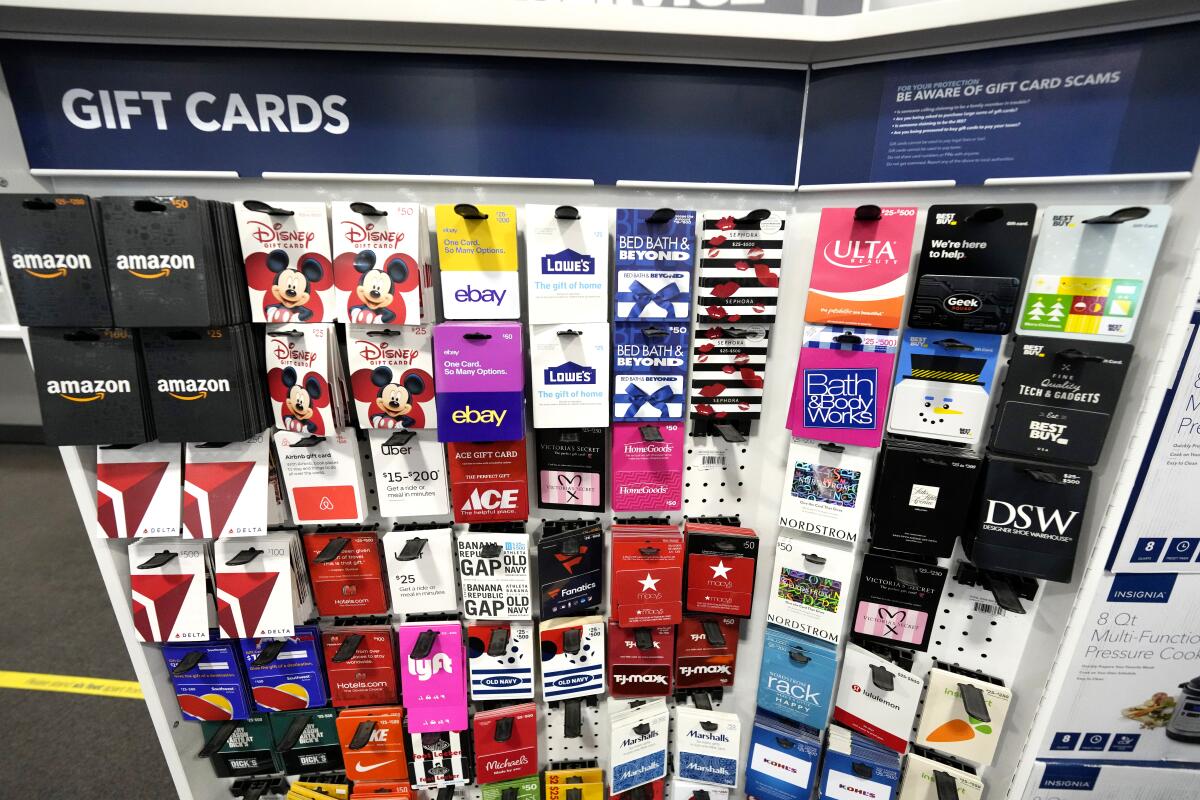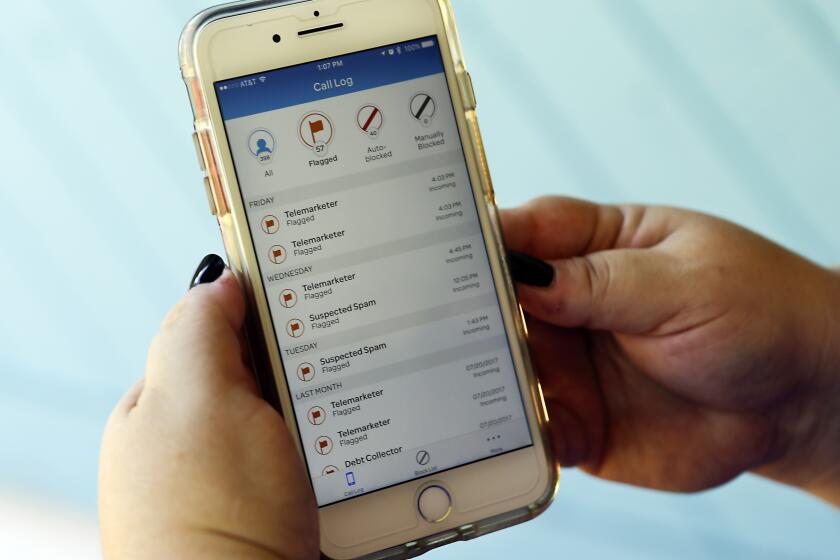Amid holiday scam warnings, I’m contacted by a holiday scammer

- Share via
The FBI and Better Business Bureau each warned consumers in recent days to be vigilant for holiday scams.
As it happens, the warnings were issued just as I was exchanging emails with a holiday scammer.
The first message I received was ostensibly from Brian Borsook, an actual doctor in Torrance.
“Hi there,” the email said. “Just wondering if I can get a quick favor from you.”
Sure, I responded. I receive emails all the time from people in the medical profession (some of which turn into columns, such as last week’s piece involving leaked documents that showed huge markups by Scripps Memorial Hospital).
“Good to hear from you,” came the reply. “I am so sorry for bothering you with this mail.”
Then came the tip-off that I wasn’t really corresponding with Dr. Borsook.
“I need to get Google Play gift cards for my friend,” the email elaborated. “I can’t do this now because I’m currently in isolation for Covid and I tried purchasing online but unfortunately no luck with that.”
What are the problems here? Let us count the ways.
Screenshots of a system used by Scripps Memorial Hospital show markups of as much as 675% being imposed automatically during treatment.
First, gift cards. I can’t say this strongly enough: Any online request for untraceable, nonrefundable gift cards is a scam. That’s particularly true if you’re unsure of the person or organization making the request.
Second, the scammer said he couldn’t buy the gift cards himself (I’m assuming it’s a guy; most scammers are). He’s holed up with COVID-19.
According to the Federal Trade Commission, pandemic-related scams have soared since the beginning of 2020. Nearly 280,000 fraud reports involving COVID have been filed with the agency, with losses approaching $650 million.
Finally, the scammer said he tried purchasing gift cards online but had no luck. That’s just silly. There are tons of sites that sell gift cards. You can also purchase gift cards directly from individual retailers, including Google Play.
“Can you get it from any store around you?” the scammer asked me. “I’ll pay back as soon as I am back. Let me know if you can handle this. Await your soonest response.”
I didn’t make him wait long. I asked how many gift cards he needs.
“Okay thanks,” Fake Dr. Borsook answered. “I will need you to get the card for $100 x 5 and scratch the back of the 5 cards to reveal the pins, then take a photo off the back of the cards showing the pin.”
Which is to say, he was brazenly instructing me to provide him with the card numbers and PINs for $500 worth of gift cards.
Scam calls and COVID-19 rackets are on the rise as a result of people being stuck at home, officials warn.
Once I did that, the scammer told me, he’d forward the info to his friend and she’d have a very Merry Christmas. And in case I was too Grinchy to be motivated by that, I was told she also has a birthday coming up.
I asked where I should purchase the gift cards. The scammer helpfully said they’re available at Walgreens, Target, Dollar General, Kroger, CVS, 7-Eleven and Best Buy.
It was finally time for me to take control of things.
“I’m sorry to be rude,” I wrote back, “but how do we know each other again?”
And that’s where the conversation stopped. The scammer, having no good answer to that question, moved on to another potential victim.
A spokesperson for Dr. Borsook’s Torrance practice said I’m not the first person to inquire about questionable emails in his name. Apparently the good doctor’s evil twin has been reaching out to a number of people in the region, thus victimizing him as well.
“Yes, we are aware of this and have our IT guy looking into it,” the spokesperson said.
The IT guy probably won’t find much, except that the scammer is employing a common trick when it comes to online imposter schemes.
Even though the emails appear to be from “Brian Borsook,” a close look at the sender’s Gmail address shows that he added an extra letter — “Borsoook.”
It’s all too easy for email recipients to overlook such subtle changes, making a phony email look legit. It also saves the scammer the hassle of hacking an actual email account.
Always examine the web or email address of a suspicious request or offer. Extra letters or characters tell you it’s not the real deal.
An L.A. man says he’s receiving as many eight calls a day from a telemarketer called Quantum 3 Media. Trying to reach the company is near impossible.
The FBI says its Internet Crime Complaint Center received a record number of fraud reports last year — nearly 800,000.
“Scammers don’t take a holiday, unfortunately, and the top thing on their list right now is stealing people’s hard-earned money,” the agency warned in a recent announcement.
It advised consumers to steer clear of unfamiliar websites promising big discounts on brand-name goods. It also called any request for gift cards “a major red flag for fraud.”
For its part, the Better Business Bureau says holiday scams are on the rise and that consumers should be especially wary of offers or requests made by email or social media.
“Exercise caution when coming across social media ads about discounted items, event promotions, job opportunities and donation requests, as well as direct messages from strangers,” the organization warned.
“If you are asked to make a payment or donation by wire or e-transfer, through third parties, by prepaid debit or gift cards, treat this as a red flag.”
Be mindful as well that scammers exploit the “season of giving” with bogus charity requests, not to mention requests for bogus charities.
Make sure you’re dealing with an actual nonprofit group. Check it out on sites such as Charity Navigator and CharityWatch.
Only use credit cards for online transactions. Your chances of being protected from fraud are much better than if you use a debit card or most other forms of payment.
And although it’s nice to think any of us might be contacted by a celebrity at any moment, that just doesn’t happen much in real life. So ignore any email or social-media contact purporting to be from a movie or TV star.
Yes, that includes Keanu Reeves, who scammers would have us think devotes every waking hour to connecting with fans online and asking them for money. Spoiler alert: He doesn’t.
Oh, and Fake Dr. Borsook, you might want to pick your intended victims more carefully. Targeting an latimes.com email address for someone who writes frequently about scams probably isn’t the shrewdest move.
That said, please send me the location of where I can drop off those gift cards. I totally promise not to immediately pass it along to the FBI. Trust me.
More to Read
Inside the business of entertainment
The Wide Shot brings you news, analysis and insights on everything from streaming wars to production — and what it all means for the future.
You may occasionally receive promotional content from the Los Angeles Times.












